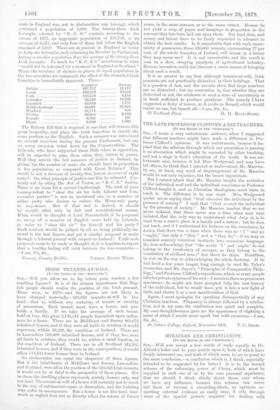IRISH TENANTS-AT-WILL.
(To THE EDITOR OF THE SPECTATOR:1
SIR,—Will you allow me to lay before your readers a few startling figures? It is of the utmost importance that Eng- lish people should realise the position of the Irish peasant. There were, in 1870—and the figures are not likely to have changed materially-526,628 tenants-at-will in Ire- land,—that is, without any certainty of tenure or security of possession. Each tenant must have a house, and pro- bably a family. If we take the average of each house- hold at four, this gives 2,106,512 people dependent upon suffer- ance for a home. There are in Middlesex and Surrey 489,672 inhabited houses, and if they were all liable to eviction, it would represent, within 36,328, the condition of Ireland. There are in Lancashire 530,490 inhabited houses, and if they, too, were all liable to eviction, they would be, within a small fraction, in the condition of Ireland. There are in all Scotland 412,185 inhabited houses, and if they were in the same position, it would affect 114,443 fewer homes than in Ireland.
No declamation can equal the eloquence of these figures. But if the inhabitants of Middlesex and Surrey, Lancashire, and Scotland, were all in the position of the 526,628 Irish tenants, it would not be so fatal to the prosperity of those places. For in these the dwelling-places represent, mainly, houses only, and not land. The tenant-at-will of a house will certainly not do much in the way of substantial repair or decoration, and the building may stiffer in consequence. But a house is not like land, inas- much as neglect does not as directly affect the return of future years, in the same manner, or to the same extent. Houses do not yield a crop of paper and hangings in proportion to the amount that has been laid out upon them. But land does, and money and labour have to be freely expended in advance to obtain the best results. Is it conceivable that with such uncer- tainty of possession, these 526,000 tenants, representing 77 per cent, of the whole tenantry of Ireland, will invest in a future they may never see P It is not conceivable, and the result is seen in a slow, creeping paralysis of agricultural industry. Human invention could not discover a surer means of bringing about such a result.
It is no answer to say that although tenants-at-will, Irish peasants are not practically disturbed in their holdings. That is a question of fact, and the records show that large numbers are so disturbed ; but my contention is, that whether they are disturbed or not, the existence of such a state of uncertainty is in itself sufficient to produce paralysis. The remedy I have suggested is fixity of tenure, as it exists in Bengal, which would injure no one, but benefit all.—I am, Sir, &c.,


































 Previous page
Previous page